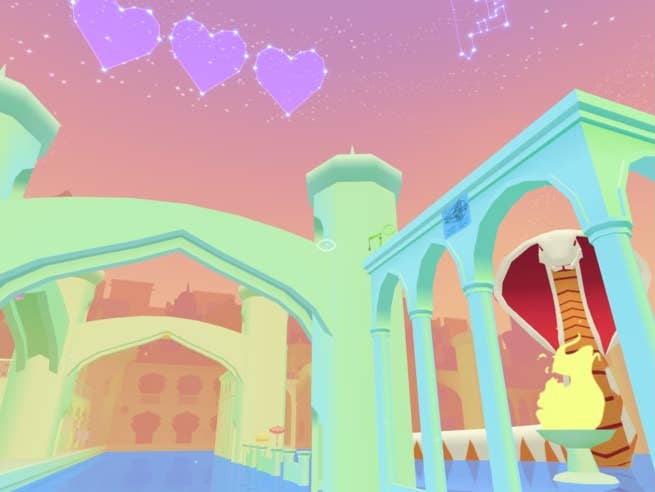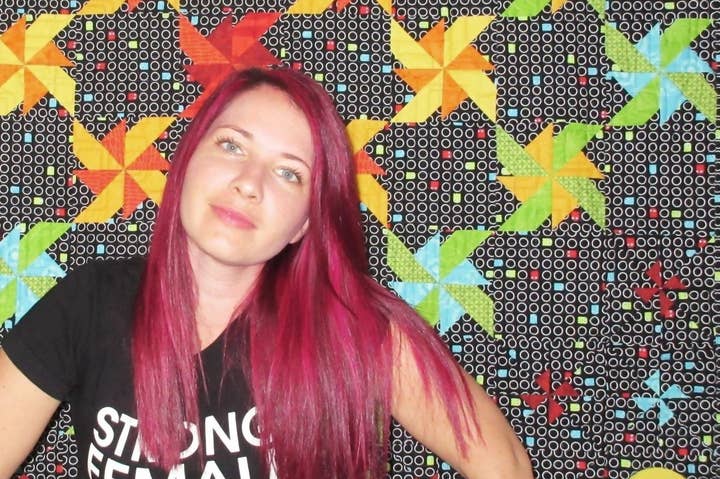How Bazaar: Theresa Duringer's view of VR
Creator of Cannon Brawl is taking on VR development with Temple Gates Games
Developer Theresa Duringer is best known as the creator of innovative action-RTS game Cannon Brawl, but more recently she's turned her attention to the virtual reality as one of the co-founders of indie studio Temple Gates Games. There the team is working on Bazaar, a brightly coloured magic carpet ride that was a winner in the recent Oculus Mobile VR Jam 2015.
We're kind of game jam junkies and we heard about the Oculus VR Jam. We were all working in a shared office, where we make games, but we weren't all at the same company. We just decided to work on it. I wasn't sure what to expect, but I think we just all had a really good experience with it. We ended up being winners in the jam. That felt validating.
We found that this space right now is really unexplored, so there's a lot of room to be completely innovative. In fact, you have to be, because so much is unproven. It's very obvious how a user's going to interact with a console game or a PC game. It's not obvious at all how they're going to interact with a virtual reality game. I think that unexplored territory was really exciting for us.
So I've been making games for about a decade. My last indie game is called Cannon Brawl. That game design really came from a cavity in the market. It was something that I wanted to play that didn't exist.
I didn't have a ton of experience even just playing with VR being doing this jam. I didn't have that go-to idea of, "Oh, I really wish I could be playing this thing right now," and it's available. We had this sort of backwards process of just coming up with some things, adding them, and then doing play tests like crazy to see what was successful. The game really organically grew out of that.
"You can't just rely on this existing relationship between players and virtual reality games"
The initial seed or little nugget that we started with was this sort of Turkish lantern shop that I had visited. It was very aesthetically driven design at the beginning.
The game has really changed from where it was because it didn't have that single-minded vision of where it was going at the beginning. The design has changed quite a bit from what we've submitted for the jam. We learned things like keeping what your burdening the player with figuring out really simple, because there's so little that's been established, you can't just rely on this existing relationship between players and virtual reality games.
I think controls-wise, we just wanted to keep it really simple. I don't know. I was really inspired by some of the stuff that my teammates at Maxis did with the Spore editors and keeping things really elegant.
I think just pairing it down and forcing ourselves to have some discipline there sort of informed what we were going to do with the game, but in retrospect, it was really helpful as well, because we're planning to release on multiple platforms. That really opens it up for us to not tie ourselves too closely to any particular input system.

Well the crazy thing is I really believe we are going to be shaping that. The developers who are working on it right now and the hardware manufacturers who are working on it right now are really going to be establishing the rules and the expectations. That's not to say that they can't change. Obviously, capitalism and market forces as well will drive things cheaper or push things in different directions.
That's really one of the crazy things about being in this field right now. It does feel like we have this opportunity to make history and shape history. I've never experienced this as a developer before and it's really exciting. It feels like a lot of responsibility on all of us, not like me in particular, but the entire development community.
I don't know. Right now, because there is no market, it's a bit of a luxury field. People who are developing in it have either gotten external funding or have been self-funded from previous projects. I think because of that, the development community right now tends to be very idealistic, a little Utopian, sort of kumbaya. That's going to change quite a bit as soon as people start buying games.
I'm personally working on premium model games. I know the industry tends to be about freemium right now. I've made sort of a philosophical decision to just ... I tend to do free demos so that people can try something out. If they like it, they can just buy it.
"You know what's really scaring me is the prospect of what people could do with ads [in VR]"
You know what's really scaring me is the prospect of what people could do with ads. I mean, ads aren't evil, but the combination of the immersion... You could be a little trapped when you're in VR. If something was overbearing, then you [could] have a combination of children or impressionable young people... I hope that our industry can take a moral step to make sure that people aren't being too exploited.
There's this weird back and forth between AAA and indie. I think really indie has just become that experimental sandbox area, where it's so risk-free, relatively speaking because the budgets are so low. To try something crazy with indie and then if it gets proven out as successful, then triple A's can come along and say, "Okay. Here, I'm going to justify to my investors or I'm going to justify to the executives. Look, this is successful so we can go ahead and put a multi-million dollar budget behind a similar type of game."
Right now, there's no VR market yet. There's no proven super duper fun thing that tons of people are in agreement about. I totally think it's going to just be the indies who have fun at the beginning of this craziness.









